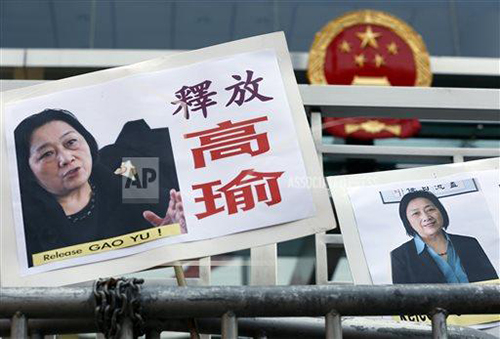The lawyer for jailed Chinese journalist Gao Yu says the freelance reporter’s health has declined since she was sentenced in April to seven years in prison for leaking state secrets. Shang Baojun, who visited Gao in Beijing No.1 Detention Center on July 28, told CPJ that Gao says she is scared she will die in prison after hearing the results of a health check.
Shang told CPJ that doctors found abnormal lymph nodes in Gao’s neck earlier this month, but they do not yet know if the abnormality is malignant. Gao, who is 71, already suffers from heart disease, high blood pressure, and Meniere’s disease, which can cause severe dizziness. Shang and Mo Shaoping, who is also representing Gao, said they plan to apply for bail based on the results of the health check. Previous requests for bail have been denied, Shang said.
Gao, who was accused of passing a confidential Communist Party document to an international media outlet, has denied the accusations against her. The freelance reporter, who covered politics and the economy in Hong Kong and for international media, lodged an appeal with the Beijing Higher People’s Court, according to reports.
Shang and Gao’s son Zhao Meng, who also spoke with CPJ this week about his concerns for her wellbeing, have called for the journalist’s immediate and unconditional release.
Gao was in her usual good spirits when Shang visited in early July, but he told CPJ she was low when he saw her this week. “She told me, ‘I don’t want to die here,’ ” he said. “But even if she doesn’t want to die here, the authorities apparently want her to pay some price.”
That price could refer to the guilty plea Shang claims authorities have been trying to get from her. The lawyer said that since May police have been pressuring Gao to confess to gain leniency. She has been questioned almost daily and for about 10 hours a day, he said.
Authorities also asked Gao to dismiss her lawyers, but she refused, Shang told CPJ. “This kind of blatant interference in the relationship between lawyers and the defendant is unprecedented,” said Shang. “They regard us as obstacles to their work. I think because we didn’t persuade our client to plead guilty.”
Gao’s son added: “To demand my mother plead guilty so she could get a lighter sentence is shameless.” Zhao told CPJ that prison authorities will not let the family send Gao money and clothes directly, which other prisoners are allowed to receive. “Even if you are a murderer or a burglar, your family can bring you goods as long as they fall within what is permitted to be brought into prison. But we have to first send requests to the police. If we go to the detention center and say ‘we want to give this to Gao Yu,’ they tell us that they are not holding that person,” Zhao said. “And they do not allow us to write letters to my mother.”
Zhao and Shang told CPJ that the Chinese government has been exerting pressure directly on the family and Gao’s lawyers. Beijing police today told her brother, Gao Wei, to stop speaking publicly about the case, one day after he spoke with the Hong Kong-based daily South China Morning Post, Zhao said. Police previously warned Gao Wei that if he continues to speak publicly, “This issue can get really big,” according to Zhao. “I am not sure what exactly that means, but they could arrest my uncle next. Isn’t that why I was detained for a month?” Zhao added, referring to how he was arrested alongside his mother in April 2014. Zhao, who was also suspected of leaking state secrets, was released on bail a month later without charge, according to reports.
Shang told CPJ that authorities have told him and Mo many times not to discuss the case with the international press. The most recent warning was last week, when officers from the Beijing Bureau of Justice and police visited Shang and Mo’s law firm in Beijing. When asked if he feels pressure over China’s crackdown on human rights lawyers, Shang told CPJ: “If all lawyers get scared and decide to quit, who are going to defend people like Gao?”
